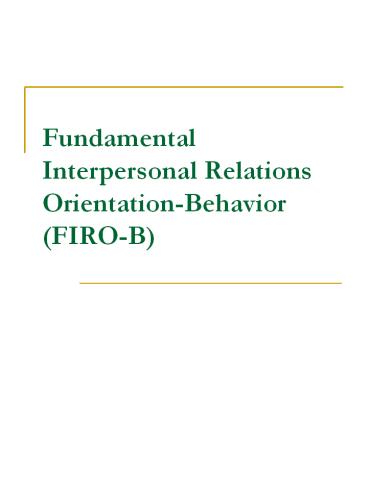Fundamental Interpersonal Relations Orientation-Behavior (FIRO-B) - PowerPoint PPT Presentation
Title:
Fundamental Interpersonal Relations Orientation-Behavior (FIRO-B)
Description:
Fundamental Interpersonal Relations Orientation-Behavior (FIRO-B) Need-based Theories Needs and Drives An unsatisfied need creates tension, which stimulates drives ... – PowerPoint PPT presentation
Number of Views:357
Avg rating:3.0/5.0
Title: Fundamental Interpersonal Relations Orientation-Behavior (FIRO-B)
1
Fundamental Interpersonal Relations
Orientation-Behavior (FIRO-B)
2
Need-based Theories
- Needs and Drives
- An unsatisfied need creates tension, which
stimulates drives within the individual. - These drives generate a search for particular
goals that, if attained, will satisfy the need
and lead to the reduction of tension. - Motivated employees are in a state of tension.
- To relieve this tension, they engage in activity.
- The greater the tension, the more activity will
be needed to bring about relief.
3
What is a Need? Cont.
Unsatisfied need
Tension
Drives
Search behavior
Satisfied need
Reduction of tension
4
McClellands Theory of Needs
- David McClelland and others have proposed three
major relevant motives or needs in the workplace,
McClelland's Theory of Needs. - The need for achievement (nAch) is the drive to
excel, to achieve in relation to a set of
standards, to strive to succeed. - The need for power (nPow) is the need to make
others behave in a way they would not have
behaved otherwise. - The need for affiliation (nAff) is the desire for
friendly and close interpersonal relationships.
5
McClellands Theory of Needs
- Some people have a compelling drive to succeed,
but they are striving for personal achievement
rather than the rewards of success. (nAch) - McClelland found that high achievers
differentiate themselves from others by their
desire to do things better. - They seek situations in which they can attain
personal responsibility for finding solutions to
problems, receive rapid and unambiguous feedback
on their performance, and set moderately
challenging goals. - They prefer working at a challenging problem and
accepting the personal responsibility for success
or failure rather than leaving the outcome to
chance or the actions of others. - High achievers perform best when they perceive
their probability of success as 50-50. - They like to set realistic but difficult goals
that require stretching themselves a little.
6
McClellands Theory of Needs Power/Affiliation
- The need for power is the desire to have an
impact, to be influential, and to control others. - Individuals high in nPow enjoy being in charge,
strive for influence over others, prefer
competitive and status-oriented situations, and
tend to be more concerned with gaining prestige
and influence over others than with effective
performance. - The third need is the need for affiliation.
- This need has received the least attention of
researchers. - Individuals with a high nAff strive for
friendship, prefer cooperative situations rather
than competitive ones, and desire relationships
involving a high degree of mutual understanding.
7
FOR0-B is another need based theory
- Its a tool to help you think about your
behavior towards other individuals and their
actions directed at you. - As with any paper and pencil test of
personality, FIRO-B measures very little. It
is offered here only for reflection and
discussion. Do not use or think of it as a
reliable or valid measure of personality.
8
- The FIRO-B measures a persons needs for
- Expressed Behavior (E) what a person prefers to
do, and how much that person wants to initiate
action - Wanted Behavior (W) how much a person wants
others to initiate action, and how much that
person wants to be the recipient
9
- Control
- Expressed I try to exert control and influence
over things and others. I enjoy organizing things
and directing others. - Wanted I feel most comfortable working in
well-defined situations. I try to get clear
expectations and instructions.
10
- AffectionExpressed
- I make an effort to get close to people. I am
comfortable expressing personal feelings and I
try to be supportive of others. Wanted - I want others to act warmly towards me. I enjoy
it when people share their feelings with me and
when they encourage my efforts.
11
- Inclusion ExpressedI make an effort to
include others in my activities. I try to belong,
to join social groups to be with people as much
as possible. WantedI want other people to
invite me to belong. I enjoy it when others
notice me.
12
- The instrument also helps one reflect on the
needs for - Inclusion (I) recognition, belonging, and
participation - Control (C) influence, leading, and
responsibility - Affection (A) closeness, warmth, and
sensitivity































